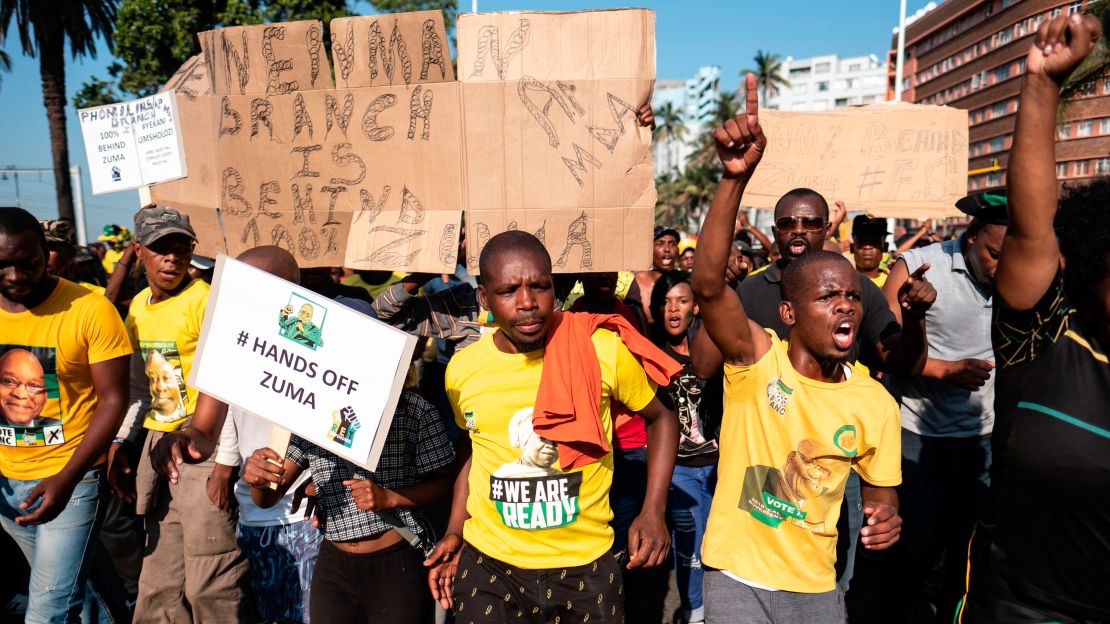South Africa’s ex-President Jacob Zuma appeared in a Durban court Friday to face multiple corruption charges relating to a billion-dollar arms deal in the late 1990s.
It’s a dramatic U-turn for Zuma, who just weeks ago held the highest office in the land. He resigned on February 14, forced out by the leadership of the ruling African National Congress, his own party.
Thousands of people turned out to support Zuma as he arrived at the high court for his first hearing. They had been asked not to wear ANC colors, but many wore wraps and T-shirts with the former president’s image.

Some supporters sang as Zuma entered the courtroom. He turned, smiling, to acknowledge them.
The former President is charged with 16 counts of corruption, money laundering and racketeering, stemming from the billion-dollar government arms deal. He is accused of receiving 783 questionable payments in connection with the deal.
Zuma, who has always said he wanted his day in court, denies any wrongdoing.
After a brief preliminary hearing, the judge adjourned court proceedings to June 8.
Despite its brevity, the hearing was notable in a continent where leaders – former or current – don’t generally face the law.
Andrew Feinstein, a former ANC member of parliament, has long accused Zuma of corruption. “But the question is, can Zuma keep himself out of court using legal machinations?” he asked.
Up until his Durban court appearance, Zuma’s legal team had been successful in doing just that with a series of mostly procedural maneuvers.
In court Friday, his defense team said it would challenge the decision to prosecute.
Slew of scandals
The arms deal controversy clouded Zuma’s reputation for decades, even before a slew of other scandals rocked his presidency.
In 2005, Zuma’s former financial adviser Schabir Shaik was convicted for “overwhelming evidence” of corruption and found guilty of organizing multiple payments to Zuma to help facilitate and protect an arms deal with a French arms company.
In 2009, the charges against Zuma were dropped just before he ascended to the presidency. They were reinstated after years of legal wrangling.
“On one level, Zuma has just run out of legal options, but there has also been a political change and it is unfortunate that that political change has meant that the National Prosecuting Authority is doing what it should have done all along,” said advocate James Grant, a former professor of law at Witwatersrand University.
A high-stakes fight
Legal experts believe the trial, should it go ahead, could take years.
The prosecution against Zuma is being led by Billy Downer, the experienced advocate who successfully prosecuted Shaik.
But criminal advocates such as Mannie Witz, who has defended everyone from gangsters to soccer stars for four decades, said the state would have its work cut out for it.
Taxpayers have spent millions footing the bill for some of South Africa’s top legal minds working on Zuma’s defense. “They understand the game and they are going to give it their all,” said Witz.
“I think they are in for a proper fight. This is going to be a 15-rounder – this is like a heavyweight competition,” he said.
Witz says that no matter what, the law now needs to take its course.
“You want to show that everybody is equal before the law and everybody is entitled to his day in court and it doesn’t make a difference if you are the president or ex-president of the country,” he said.






